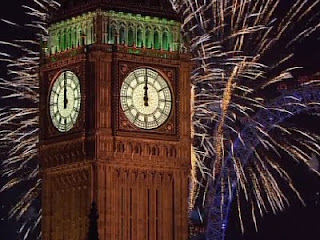At St. Paul's Cathedral, Canon Mason hails the concluding century as one in which slavery was abolished, drunkenness was controlled and respect for religion had been firmly established. Several publications remark on the similarity to the close of the 18th Century; The Annual Register notes that, then, as now, England was at war and, "at the close as at the opening of the century, she is without a Continental ally."
The Times, ever optimistic, looks ahead one hundred years to the end of the 20th Century: "We have a reasonable trust that England and her sons will emerge triumphant... and that then, and for ages to come, they will live and prosper, one united and Imperial people, to be a bulwark for the cause of men."
To mark the occasion, the Poet Laureate Alfred Austin (see December 30) comes forth with "The Passing of the Century," an effort which, sadly, can only be described as typical. A sample passage:
When the night is murk and the mist is dense,Those looking for portents can take little comfort in word that a giant stone in the ring at Stonehenge topples, something that hadn't happened since 1759.
to guide us Whither and remind us Whence,
the Soul's own lamps through shades of sense ... etc
At Osborne, the old Queen, who has reigned for 63 years of the dying century, is in poor health. In her journal, she notes: "The same unfortunate alternations of sleep and restfulness, so that I again did not get up when I wished to, which spoilt my morning and day."
At 6:30 pm, 22 January 1901, three weeks into the new century, Victoria died.






